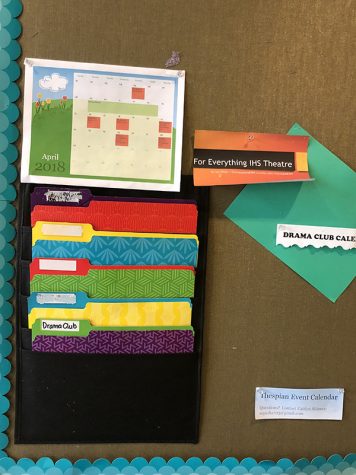Doing Nothing Can Be The Best Thing
BENEFICIAL HIATUS Junior Katy Redondo has family members who are very busy with their jobs. She agreed that they cherish the times where they have a lull in their schedule. “You’re so overwhelmed with everything in your life and you just want to have a break for yourself,” says Redondo.
May 3, 2018
Doing nothing. We often do not reflect over what it truly means to do “nothing” when our lives are constantly forcing us to be doing something. Whether it is studying for the next big test, hanging out with friends or practicing a sport, our activity-oriented society pushes individuals towards involvement in as many activities our schedules will allow. However, there are moments of reflection where we essentially feel as if we are doing nothing. Lying on the couch, staring out a window of a long car ride, and that time right before one drifts off to sleep are times when we feel as if nothing is being accomplished. Yet our minds are still doing something. Freshman Claire Taylor says, “I usually sit around at home. I usually stay home and watch a show.” Even though some people desire moments of downtime to escape the realities of their arduous lives, others prefer to constantly feel like they are completing some sort of task. Everyone is unique, as not everyone defines doing nothing as literally staring off into space, but rather as finding some kind of distraction, like a phone, that hinders your ability to achieve what we categorize as work.
For better or for worse, we live in a culture that emphasizes the importance of staying busy and feeling constant satisfaction that we are doing something. Although engaging in a variety of activities rewards individuals with invaluable experience, overburdening oneself with work and too many activities can have disastrous consequences. High schoolers often feel pushed to be in a plethora of activities because of a constant comparison of what their peers are doing, whether it be subconsciously or not. The expectations of colleges also plays a significant role in the amount of activities one is involved in. However, some individuals love to stay busy. While people’s minds are working, they might need some activity to look forward to, or to motivate them to get through their day. Junior Katy Redondo says, “I know for some people that when they’re really stressed out, having a hobby or a club, is something nice to have. When I have my problems I want something that will keep myself away from them.” However, for others, time dedicated to these various activities often correlates closely to high levels of stress as they are forced to prioritize what in their lives is to be sacrificed. A CNN article explained that almost a third of American companies have “stress-reduction programs” as the anxiety of their employees is hindering their work drive and is costing companies across America $300 billion a year. Although this seems ironic, the solution might be doing nothing.

OVERWHELMING ITINERARIES Today, individuals are often moving from one activity to the next, having limited time for any rest. Demanding involvement in activities is capable of leading to high levels of stress. CNN explained that “the World Health Organization is quoted as calling stress ‘the health epidemic of the 21st century.’
Due to the busy society we live in, there is a general stigma around doing nothing. Having downtime is commonly associated with wasting time, as many see it as a way to procrastinate and avoid work. The attitudes regarding doing nothing are complex, though many people personally adore having free time to do whatever they want, which likely includes “nothing.” Sophomore Elijah Beilinson believes that in our society, free time is “sort of idolized more than anything” as people desire time to do what they are passionate about. Others naively believe that we are mentally invincible, and are capable of working almost to exhaustion. CNN estimated that it takes the average person 25 minutes to recover fully from an email or phone call and return back to his or her previous productivity levels. It was also estimated that the average person is interrupted when trying to complete a task every 11 minutes. Despite our best efforts, we are not capable of working around-the-clock as unforeseen circumstances have the tendency to arise when we least expect them to. What many consider a “waste of time,” is actually an opportunity for our minds to catch up on the overwhelming nature of life and ultimately be more productive.
Doing nothing is often linked to stimulating creativity; when people are bored, they attempt to think of creative ways to alleviate that boredom. However, many people appreciate “being bored” as they desire time for themselves where they do not have to stress about the complications of life. Others enjoy keeping busy, due to the fact that some need avid participation in various activities to distract them from their distressing lives. Although having downtime is obviously vital to our physical health, as it allows time for our bodies to heal, yet it is also invaluable to our mental health. Having time to do nothing allows our brains to fully process the events of our lives, further consolidating our memories and helping individuals learn. Doing nothing, or specifically dedicating time to step away from a rigorous task is often associated with the “incubation effect.” When we cease to work on a project, and hopefully spend time to sit around and reflect, our minds get unconscious time to process the situation. In a study expressed in The Guardian, people who were engaged in a challenging task and were instructed that they would receive a break before returning to the task, performed significantly better on the task in comparison to those who did not receive an interruption. Even when individuals step away from a task, their minds are still trying to process a solution. This is why on tests, we are often told to skip problems that we do not understand right away; the “incubation effect” allows our minds to still be exploring possible solutions while we are consciously working on another task.
Having time to ourselves where we limit any outside distractions allows us to take a breather from our typically hectic lives. My friends and I have talked about how when we have a hiatus in our work schedule, we still have a feeling of “impending doom,” or the constant fear that some task is going to magically appear and demand to be accomplished. We personally adore having time to essentially do nothing without the added guilt of avoiding some task that needs to be completed. Freshman Rodger Kline says that with downtime “you would be less stressed and more relieved if you didn’t have as much going on. You have more time to evaluate yourself.” When we allow our minds to roam free, without the added complications of work, we often discover who we want to be. As cheesy as it is, we realize our aspirations and who we want to be in moments of calm. Experiences only get you so far; quiet time to reflect over events, even if we are not directly thinking about it, shapes who we are as individuals.
As we get older, individuals tend to appreciate the moments where they are not expected to be doing anything. Senior Jacob Barsher agrees and says, “Because you’ve worked for so many years, you want your time off.” Personally, when I was younger I loved going from activity to activity because I associated them with having fun. Now however I unfortunately associate too many activities with stress. As our schedules increase in activities, we are often forced to prioritize what will benefit us the most in the future. Senior Sydney Merrin, for example, is a part of the Washington Network for Innovative Careers (WANIC) program that specializes in offering Career and Technical Education courses for specific career paths. Through this program she is on track to become a nurse, yet these courses require a solid amount of time. In preparation for her senior year, she had to determine if she wanted to continue singing in choir, or take the nursing programs that would eventually provide invaluable skills and credits to becoming a nurse. Merrin explains how “there are days that are going to be busier than others, and just being able to see [the courses] as things that you love, so that they don’t seem so tedious.” Engaging in activities that you have a passion for alleviate the overwhelming nature of having a busy schedule.
It is often challenging to work downtime into one’s schedule. Junior Luka Kovac recommends to “know your load of what you’re taking” and truly understand what you are capable of before you push yourself too far. Especially when deicing what courses to take, it is vital to keep in mind how much time you are willing to dedicate to homework if you have various activities that you are involved in. However, for many, downtime is something that happens naturally whenever you have a spare moment. Scheduling time when you having nothing scheduled seems counterintuitive. The best times to reflect are often unexpected moments of calm when you have nothing that needs to be done. Sophomore Katie MacNary suggests doing, “hobbies that let you think” as they are “calming” and allow for time to process. MacNary personally enjoys painting as it is an activity that provides time to let one’s mind wander. Doing nothing takes various forms whether we consciously think about it or not. Next time you have a moment of free time, although it may feel abnormal, try staring out a window. It may seem like a complete waste of time, but your mind will thank you.


